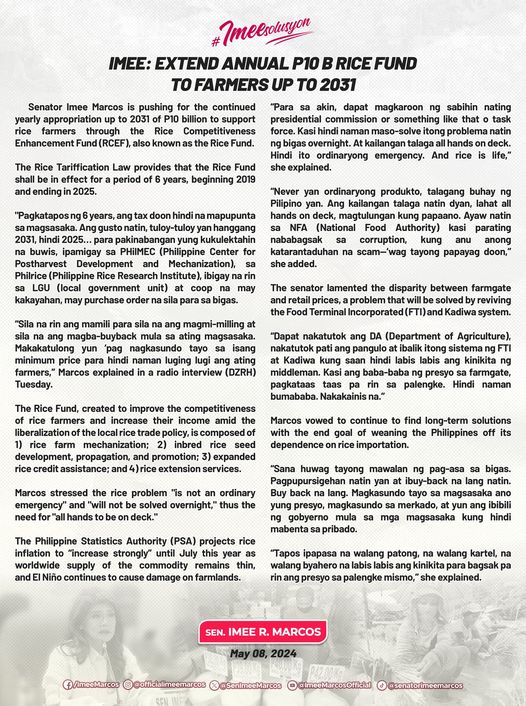
MANILA, Philippines – Senator Imee Marcos is pushing for the continued yearly appropriation up to 2031 of P10 billion to support rice farmers through the Rice Competitiveness Enhancement Fund (RCEF), also known as the Rice Fund.
The Rice Tariffication Law provides that the Rice Fund shall be in effect for a period of 6 years, beginning 2019 and ending in 2025.
“Pagkatapos ng 6 years, ang tax doon hindi na mapupunta sa magsasaka. Ang gusto natin, tuloy-tuloy yan hanggang 2031, hindi 2025… para pakinabangan yung kukulektahin na buwis, ipamigay sa PHilMEC (Philippine Center for Postharvest Development and Mechanization), sa Philrice (Philippine Rice Research Institute), ibigay na rin sa LGU (local government unit) at coop na may kakayahan, may purchase order na sila para sa bigas. Sila na rin ang mamili para sila na ang magmi-milling at sila na ang magba-buyback mula sa ating magsasaka. Makakatulong yun ‘pag nagkasundo tayo sa isang minimum price para hindi naman luging lugi ang ating farmers,” Marcos explained in a radio interview (DZRH) Tuesday.
(After 6 years, the tax won’t go to farmers. We want continuous funding until 2031, not 2025… so that the collected taxes can be utilized, distributed to PHilMEC (Philippine Center for Postharvest Development and Mechanization), to Philrice (Philippine Rice Research Institute), also to LGUs (local government units) and capable coops, with purchase orders for rice. They will also purchase for milling and buyback from our farmers. That will help when we agree on a minimum price so our farmers won’t be at a loss.)
The Rice Fund, created to improve the competitiveness of rice farmers and increase their income amid the liberalization of the local rice trade policy, is composed of:
- rice farm mechanization;
- inbred rice seed development, propagation, and promotion;
- expanded rice credit assistance; and
- rice extension services.
Marcos stressed the rice problem “is not an ordinary emergency” and “will not be solved overnight,” thus the need for “all hands to be on deck.
The Philippine Statistics Authority (PSA) projects rice inflation to “increase strongly” until July this year as worldwide supply of the commodity remains thin, and El Niño continues to cause damage on farmlands.
“Para sa akin, dapat magkaroon ng sabihin nating presidential commission or something like that o task force. Kasi hindi naman maso-solve itong problema natin ng bigas overnight. At kailangan talaga all hands on deck. Hindi ito ordinaryong emergency. And rice is life,” she explained.
(For me, there should be, let’s say, a presidential commission or something like that or a task force. Because this rice problem won’t be solved overnight. And we really need all hands on deck. This is not an ordinary emergency.)
“Never yan ordinaryong produkto, talagang buhay ng Pilipino yan. Ang kailangan talaga natin dyan, lahat all hands on deck, magtulungan kung papaano. Ayaw natin sa NFA (National Food Authority) kasi parating nababagsak sa corruption, kung anu anong katarantaduhan na scam—‘wag tayong papayag doon,” she added.
(That’s not just an ordinary product, it’s really the lifeblood of Filipinos. What we really need there is, everyone, all hands on deck, to help figure out how. We don’t want the NFA (National Food Authority) because it always falls into corruption, all sorts of nonsense scams—let’s not allow that.)
The senator lamented the disparity between farmgate and retail prices, a problem that will be solved by reviving the Food Terminal Incorporated (FTI) and Kadiwa system.
“Dapat nakatutok ang DA (Department of Agriculture), nakatutok pati ang pangulo at ibalik itong sistema ng FTI at Kadiwa kung saan hindi labis labis ang kinikita ng middleman. Kasi ang baba-baba ng presyo sa farmgate, pagkataas taas pa rin sa palengke. Hindi naman bumababa. Nakakainis na,” the senator stated.
(The Department of Agriculture (DA) should be focused, even the president, and bring back the FTI and Kadiwa system where middlemen don’t excessively profit. Because prices at the farmgate are very low, yet they keep rising in the market. They don’t decrease. It’s frustrating.)
Marcos vowed to continue to find long-term solutions with the end goal of weaning the Philippines off its dependence on rice importation.
“Sana huwag tayong mawalan ng pag-asa sa bigas. Pagpupursigehan natin yan at ibuy-back na lang natin. Buy back na lang. Magkasundo tayo sa magsasaka ano yung presyo, magkasundo sa merkado, at yun ang ibibili ng gobyerno mula sa mga magsasaka kung hindi mabenta sa pribado. Tapos ipapasa na walang patong, na walang kartel, na walang byahero na labis labis ang kinikita para bagsak pa rin ang presyo sa palengke mismo,” she explained.
(Let’s not lose hope in rice. Let’s pursue it and just buy it back. Just buy it back. Let’s agree with the farmers on the price, agree on the market, and that’s what the government will buy from the farmers if it’s not sold privately. Then it will be distributed without markup, without cartels, without traders excessively profiting, so the price at the market remains low.)
Share
